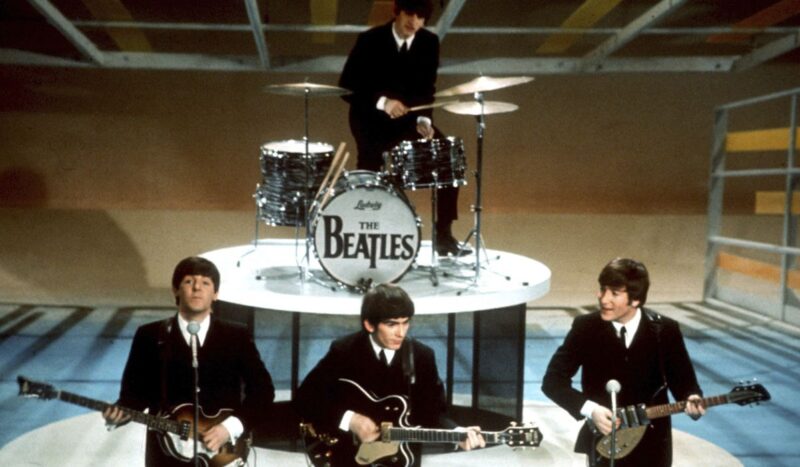Third of 4 components
Pyotr Ilyich Tchaikovsky, the Russian composer identified for the “Nutcracker” ballet and luxurious string preparations, died 130 years in the past.
But his affect exhibits up three minutes into “Vertigo,” a song that makes use of synthetic intelligence to fuse a melody from singer-songwriter Kemi Sulola with sounds generated by NoiseBandNet, a pc mannequin from doctoral scholar Adrián Barahona-Ríos on the College of York within the U.Ok. and affiliate professor of music engineering expertise Tom Collins on the College of Miami’s Frost Faculty of Music.
The mannequin used Tchaikovsky’s “Memento de Florence” string sextet, ambient noises and different “coaching” clips to generate audio samples based mostly on musical concepts from Ms. Sulola, leading to a novel sonic panorama.
The tune received third place on the Worldwide 2023 AI Music Contest.
SEE ALSO: Hype and hazards: Synthetic intelligence is abruptly very actual
“It’s an excellent instance of expertise, or innovation in expertise, simply sort of being a catalyst for creativity,” Mr. Collins stated. “We’d not have written a tune with Kemi Sulola — and he or she wouldn’t have written one with us — have been it not for this curiosity round AI.”
Synthetic intelligence, which permits machines to obtain inputs, study and carry out human-like duties, is making a splash in well being care, schooling and a number of financial sectors. It additionally has seismic implications for music-making and report labels, posing existential questions in regards to the which means of creativity and whether or not machines are enhancing human inspiration or changing it.
Because of speedy developments in AI expertise, the online is chock filled with applications that may clone the Beatles’ John Lennon, Nirvana’s Kurt Cobain or different well-known voices or spit out accomplished songs with just a few textual content prompts, difficult the copyright panorama and sparking blended feelings in listeners who’re amused by new prospects however skittish about what comes subsequent.
“Music’s necessary. AI is altering that relationship. We have to navigate that rigorously,” stated Martin Clancy, an Eire-based knowledgeable who’s labored on chart-topping songs and is the founding chairman of the IEEE World AI Ethics Arts Committee.
On-line mills that may produce totally baked songs on their very own is a side of AI-in-music that’s exploded within the final 12 months or two, alongside the excitement about ChatGPT, a well-liked chatbot that enables customers to generate written items.
Different AI and machine-learning applications in music embrace “tone switch” apps that let you sing a melody and have it come again within the type of, say, a trumpet as an alternative of your voice.
SEE ALSO: Ex-Google engineer fired over claiming AI is sentient is now warning of doomsday situations
Extra applications assist you combine and grasp demo tapes by counting on machines to scan them and allow you to know if there ought to be a bit extra vocals right here or rather less drums there.
Even these steeped within the AI music phenomenon discover it laborious to maintain up.
“There’s a degree in every semester the place I say one thing isn’t attainable but after which some scholar finds that actual factor has been launched to the general public,” stated Jason Palamara, an assistant professor of music expertise at Indiana College, Indianapolis.
Some AI applications can fill a so-called expertise hole by permitting creators with a musical concept to precise it totally. It’s one factor to have a tough melody or harmonic concept, but it’s one other to execute it in the event you don’t have the instrumental expertise, studio time or potential to enlist an ensemble.
“That’s the place I believe the actually thrilling stuff is already occurring,” Mr. Collins stated, utilizing the instance of somebody who needs so as to add a bossa nova beat to a tune however wants a program to inform them how as a result of it’s not a part of their musical palette. “That’s what I can do with the generative AI that I couldn’t do earlier than.”
Different AI advances in music are geared towards having enjoyable. Suno AI’s “Chirp” app, as an illustration, can spit out a tune inside minutes after you kind in just a few directions.
“In the event you did the entire 10 gross sales factors for re-introducing the ukulele to market now in North America, we’d see a correlation between the gross sales pitch for that and for AI music,” stated Mr. Clancy, referring to the four-string instrument that provides many individuals an entry level to instrument-playing. “It’s reasonably priced. It’s enjoyable. That’s the necessary half about these instruments. Like they’re actually, actually good enjoyable, they usually’re very easy to make use of.”
To underscore this level, Mr. Clancy requested Suno AI to write down a tune in regards to the drafting of this text. You possibly can take heed to it here.
Creators within the fast-growing area of music mills have a tendency to emphasise the necessity to democratize the music-making course of in explaining why they’re within the area. One generator, Loudly, says its rising crew is “made up of musicians, creatives and techies who deeply consider that the magic of music creation ought to be accessible to everybody.”
Voice cloning is one other well-liked entrance in AI music manufacturing. As an example, there’s a well-liked clip on the web of Soundgarden’s “Black Gap Solar” sung by Cobain as an alternative of fellow grunge icon Chris Cornell, who recorded the unique. The Beatles broke up a long time in the past however launched a brand new tune, “Now and Then,” utilizing an outdated demo and AI to provide a clearer model of the late John Lennon’s voice.
Voice cloning is a enjoyable, if considerably eerie, experiment for listeners, but it poses severe questions for the music business. One report label confronted a significant take a look at case earlier this 12 months when a consumer named “ghostwriter” uploaded a duet from rapper Drake and pop star Weeknd titled “Coronary heart on My Sleeve.” The difficulty, in fact, is that neither artist was concerned within the tune. It was crafted with voice-cloning AI.
Common Music Group sprang into motion and obtained it from streaming providers, saying it violated copyright legislation. But it raised questions on which points of the songs are managed by the labels, the artists themselves or the creators of AI content material.
“Does Drake personal the sound of his voice, or [does] simply the report label he’s signed to, UMG, personal the sound of his voice? Or is that this an authentic composition that’s truthful use?” Rick Beato, an instrumentalist and producer, stated in an AI phase on his well-liked YouTube channel about music. “Individuals are not going to cease utilizing AI. They’re going to make use of it increasingly and extra. The one query is: What are the labels going to do about it, what are the artists going to do about it and what are the followers going to do about it?”
Within the Drake-Weeknd case, Common stated the “coaching of generative AI utilizing our artists’ music” is a breach of copyright. But some artists are embracing AI, as long as they get a minimize of proceeds.
“I’ll cut up 50% royalties on any profitable AI-generated tune that makes use of my voice,” digital music producer Grimes tweeted earlier this 12 months.
The U.S. Copyright Workplace provided some readability in March about works which are largely produced by a machine alone. It stated it could not register these works.
“When an AI expertise determines the expressive components of its output, the generated materials isn’t the product of human authorship,” the steerage stated. “In consequence, that materials isn’t protected by copyright and should be disclaimed in a registration utility.”
The Biden administration, the European Union and different governments are speeding to meet up with AI and harness its advantages whereas controlling its probably opposed impacts on society. They’re additionally wading by means of copyright and different issues of legislation.
Even when they devise new laws now, the foundations seemingly won’t go into impact for years. The EU, as an illustration, just lately handed a sweeping AI legislation but it surely received’t take impact till 2025.
“That’s eternally on this house, which implies that all we’re left with is our moral decision-making,” Mr. Clancy stated.
For now, the AI-generated music panorama is a bit just like the Wild West. Many AI-generated songs are hokey, or simply not superb. And if there’s a glut of AI-generated music, then listeners may require a curator to filter by means of all of it and discover what’s price their time.
There are additionally thorny questions of whether or not utilizing the voices of artists like Cobain, who killed himself in 1994, is in good style, or what’s gained by making an attempt to generate AI music by means of him.
“If we prepare a mannequin on Nirvana, after which we are saying, ‘Give me a brand new observe by Nirvana,’ we’re not going to get a brand new observe from Nirvana, we’re gonna get a rehash of ‘Nevermind,’ ‘In Utero’ and ‘Bleach,’” Mr. Palamara stated, referring to albums the band launched in 1989-1993. “It’s not the identical factor as, like, if Kurt Cobain was alive right now. What would he do? Who is aware of what he would do?”
At a Senate listening to in November, Mr. Beato testified there ought to be an “AI Music dataset license” in order that listeners know what sort of music an AI platform skilled on, and in order that copyright holders and artists will be compensated pretty after their work contributed to the piece.
Mr. Palamara worries that as AI instruments get simpler to make use of, musicians may typically lose the flexibility to make music at a virtuosic degree. Already, some singers depend on pitch-correction applied sciences resembling Auto-Tune.
“The brand new college students coming within the door know use these applied sciences and by no means actually should attempt to sing in tune, so it makes it tougher to justify that they need to find out how,” he stated. “Some may argue that perhaps this simply means the flexibility to sing in tune is much less necessary in right now’s world, which may be true. However you’ll be able to’t argue that humankind is being improved by the erosion of sure skills we’ve been honing for hundreds of years.”
There’s additionally concern that machines might substitute jingle writers or different jobs that musicians — a few of whom are scrapping for gigs already — depend on for earnings.
On the similar time, AI is opening new alternatives for musicians and humanities organizations.
Lithuanian composer Mantautas Krukauskas and Latvian composer Māris Kupčs produced what’s being known as the primary AI-generated opera for town of Vilnius in September.
Solely the phrases for the Seventeenth-century piece, “Andromeda,” survived, however the modern-day composers restored the opera utilizing an AI system known as Composer’s Assistant.
The mannequin was developed by Martin Malandro, an affiliate professor of arithmetic at Sam Houston State College, and might fill in melody, concord, and percussion that match sure prompts. The European composers skilled the mannequin on the opera’s libretto and surviving music from the Baroque-era composer, Marco Scacchi, and his contemporaries to provide an opera that may have gave the impression of the unique, even when it wasn’t the precise rating.
Mr. Malandro stated he wasn’t straight concerned within the restoration, although stated he’s credited because the contributor of the AI mannequin, and “my understanding is that the opera was bought out and acquired effectively at its premiere.”
A British arts nonprofit, Youth Music, performed a survey and located 63% of individuals ages 16-24 say they’re embracing AI to help of their inventive course of, although curiosity wanes with age, with solely 19% of these 55 and older saying they’d be seemingly to make use of it.
Mr. Palamara stated one space that’s ripe for AI use is mixing and mastering. He took a number of the “terrible” demos his highschool band made within the Nineties and ran them by means of a program from IzoTope that analyzed the demos and located methods to make them higher.
Consultants say applications like this one may also take over some grunt work for music professionals in the event that they need to concentrate on one mission however let AI help with the assignments they should pay the payments and meet tight deadlines.
AI is “undoubtedly going to vary our musicianship,” stated Mr. Collins. “However I believe change in musicianship has been occurring for hundreds of years.”








